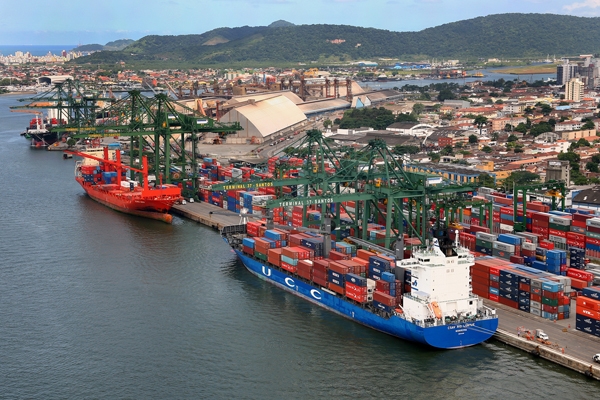The Brazilian maritime transport, responsible for more than 95% of the cargo exported and imported by the country, has been able to face the logistical disorders caused by stoppages in the productive sector due to the pandemic of the covid-19.
A survey by the National Confederation of Industry (CNI) shows that the services of regular shipping lines, with pre-defined itineraries for the transport of containers, showed stable levels of vessel utilization and the number of ships operating in ports, compared to the same. 2019 period.
The CNI warns, however, that it is essential to keep the ports operational for the country to face the pandemic without major impacts on foreign trade operations. The assessment is that the real effects of the crisis generated by the coronavirus should be noted later if the appropriate operational conditions are not prioritized by the authorities.
According to consolidated data for March, the use of vessels was 85% in exports and 67% in imports, against 82% and 68%, respectively, in the same period of 2019. In this month, the handling capacity available weekly on international routes it was 4% higher than in March of the previous year, despite the drop in the number of ships in operation – 134 against 161 in the same month of 2019. In the quarterly comparison, there were 443 vessels operating in 2020, against 440 in the first three months of last year.
Although Covid-19 has not yet caused major inconvenience to container shipping by sea, the national productive sector has experienced difficulties in other stages of the transport chain. Research released on Monday (30) by the CNI points out that 38% of the industrial companies consulted already face many difficulties resulting from the pandemic to obtain inputs and raw materials. Another 45% say they face little difficulty; and 17% say they have no problems.
With the escalation of the disease in the Americas and the deepening of the pandemic in Europe, the concern for world trade is that ports maintain their operational conditions and that cargoes can be produced, transported, shipped and delivered to their destinations. With the exception of the port of Genoa, Italy, which is at the epicenter of the crisis on the European continent, the world port sector has been able to maintain operations and meet the demands of loading and unloading. However, the way in which the pandemic will be conducted from now on is essential so that the situation in China at the beginning of the year is not repeated in other locations.
The level of service interruption at Chinese ports, which, in the first two months of the year, did not have truck drivers, stevedores and several other workers essential to the operation of these facilities, led to an abrupt drop in container handling. In mid-February, the Asian country registered an 18% level in cancellations of scheduled ship calls. From March, productive and port activities began to be normalized, but, according to UNCTAD data, the effects of the paralysis were sufficient to reduce the flows of Chinese intermediate goods by 2%, a country that accounts for 20% of the global production of these products. For Brazil alone, this rupture represented a loss of US $ 84 million.
In Brazil, even with preventive measures, the main ports and terminals continue to operate in conditions close to normal, which allowed an increase in the volume of containers handled in foreign trade. According to data from the National Waterway Transport Agency (Antaq) of January 2020, the containers handled in long-distance shipping, responsible for the country’s export and import flows, reached 6.6 million tons, a value 3% higher than the same month of the previous year.
It should be noted that, in total, foreign trade transacted in the maritime modality showed a reduction of 20% in comparison with January 2019. This result is a reflection of the drop in the movement of ore over the past year after the rupture of the dam. Brumadinho and the reduction in the amount of agricultural bulk exported at the beginning of the current year, reflecting the one-off interruption in Chinese imports of these products.
The turn of the tide in the context of world navigation
The year 2020 began in a context that indicated pressure on shipping costs. The shipping companies foresaw increases in freight values due to the requirements of the International Maritime Organization (IMO) for the reduction in sulfur emissions and the prospect of a rise in oil prices due to tensions in the Middle East. However, the proliferation of coronavirus has changed this scenario.
In the comparison between March and January 2020, the average value of freight for container exports fell from US $ 1,400 to US $ 1,264. Only the route to Africa did not show a reduction in the freight reference value in the period, while the routes connected to Asia and the Mediterranean and the Middle East, regions that until the beginning of March concentrated the largest share of contaminated by Covid-19, presented the biggest falls.
However, such reductions did not occur significantly due to falls in demand for transport services. Usually, the first months of the year observe a tendency of contraction in the values of freight, despite the values of March 2020 being, in general, below those verified in March 2019. In addition to this seasonality, they started to operate on certain routes larger vessels , which produced gains in scale and reductions in the unit price of container transport. Therefore, although the coronavirus has stopped the pressure to increase transport costs, the pandemic has not significantly or globally interrupted global shipping, at least so far.
It is also important to note that, to date, port facilities in Brazil and the world have been able to play their role in combating Covid-19. The maintenance of operational conditions in ports, the main logistical link in the country and global trade, is essential for the supply of medicines, fuels, machinery and food, which makes maritime transport an essential activity for the functioning of the economy and for the good -being of society, especially in this moment of crisis in public health. From now on, it is essential that the authorities adopt initiatives that guarantee such functioning and at the same time combat the coronavirus.
Source: Comex do Brasil







